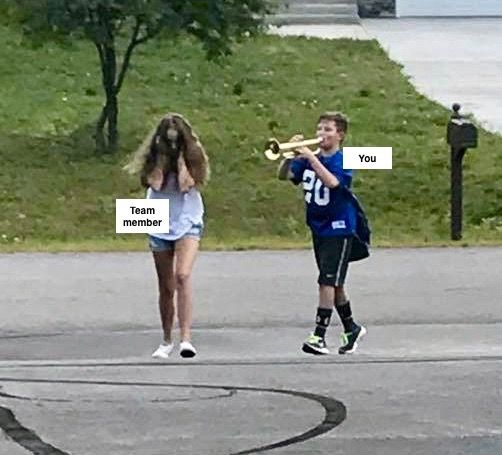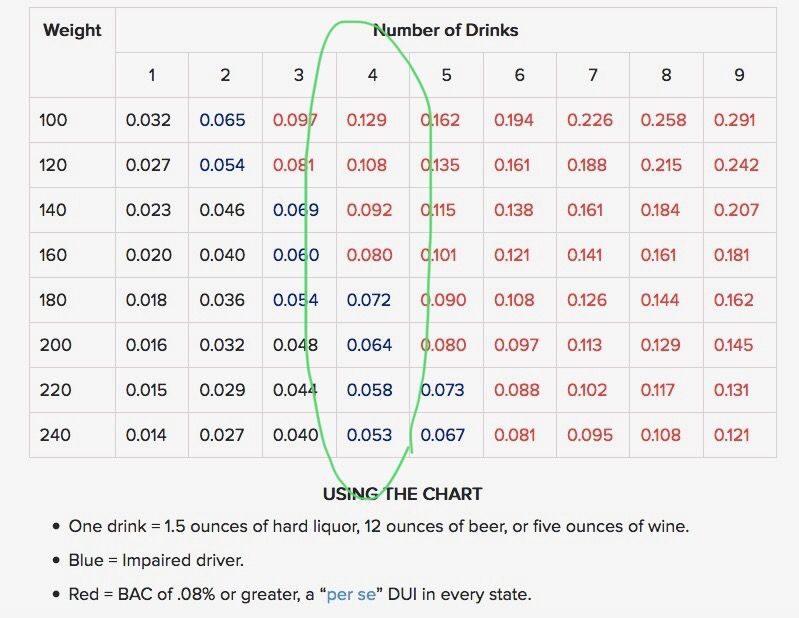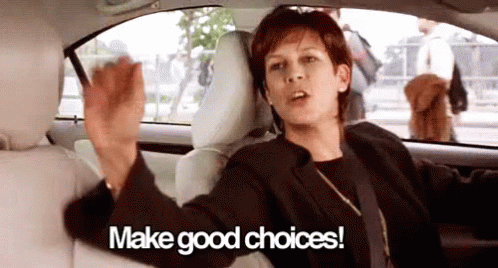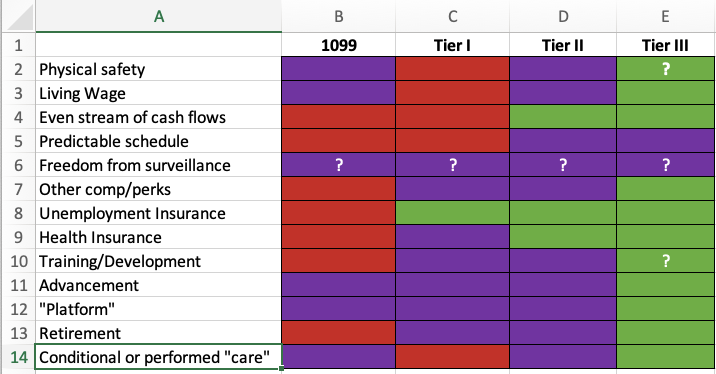The Superpower of 1:1 Meetings: On Management #32
You are the Particular in the Universal
I often get people asking if something I wrote was about them or their company.
I have a rule for myself.
I don’t write a post about a specific person or company without making it clear that the post is about that person or company.
Was This About Me? Fred Wilson
My love of people management starts with a belief that people are fascinating. Uniquely, and universally.
There are so many common themes across workplaces. Like “bad boss.”
When popular fiction is centered in a workplace, we see ourselves — even though Liz Lemon, Heidi Bergman, and Plum Kettle are decidedly not me.
Or you.
To be clear, the writing you’re reading, here, is grounded in my observations of many companies, many people, over a long time.
Tangentially related: The Good Place is actually about the workplace. Fight me.
On 1:1s (and more)
Also, my worst 2018 user error
…You’re not always in the mood for these 1:1s, you’re not always feeling up to it, but the worst thing you can do is neglect those (sic.) Because, you know, when you neglect them you just miss things about the people on your team, you miss building that relationship…you miss important stuff that you will otherwise catch much earlier if you’re talking to people regularly…The most important thing about 1:1s is just holding them regularly, and ideally at least every other week…(emphasis mine)
Camille Fournier, on the InfoQ Podcast
Early this year, I talked with Camille Fournier about people management, planning to share it here.
Then, I did something that rendered the audio of our call unusable. Ouch.
Because you can’t have the same conversation twice, I apologized and moved on.
So, I was pleased to find Charles Humble’s conversation with Camille at the InfoQ Podcast.
It’s a great discussion about managing people, whether you work in tech or not.
- Performance does not require passion for a product or industry. (6:06)
- 1:1 meetings are key for building relationships. (17:13)
- Managers are necessary! (23:49)
Have regular 1:1s. Use an agenda. Take notes.*
The best managers don’t manage the work. They manage relationships, with people.
Our relationships enable our work.
1:1 meetings power up your relationships and everyone’s work.
Be consistent. Your meetings should be a fairly immovable calendar object, weekly or bi-weekly. Repeated cancellations show your team members that their work is not a priority for you. #worstpractice.
Use an agenda. Something like this:
- Brief status on your team member’s goals, notable deadlines and follow-up items from your last meeting.
- Discussion of anything that’s stuck, and how to unstick it.
- Exchange of relevant feedback.
- Recap and discussion of follow-up actions.
Take notes! Especially when it comes to followup items.
A primary use case for you, as a manager, is helping people when they hit roadblocks. For example, a team member’s work depends on people in another team. Something’s not going smoothly. How can you help?
When you keep notes, in good order, you’ll build a valuable reference document. This will save a lot of time when reviews come up, and enable you to write a more accurate review.
I’ve heard about companies where 1:1s are (supposedly) meant to be devoted solely to personal chitchat.
What a monumental waste of time.
Use your precious time to talk about how to get things done. You’ll get to know your people by talking about their needs and wants. Sometimes it’s appropriate to discuss career goals, for example.
Yes, you can talk about other things.
That said, you are not doing your job as a manager if banter about the Knicks game blocks discussion of a team member’s problems making progress on a project. Or coaching someone on ways to improve their relationships with people on other teams.
That is to say, giving feedback.
Your weekly 1:1s offer you 50 annual opportunities to prevent big misunderstandings at review time. #priceless
An aside on goals: if you haven’t set and communicated concrete goals for each person on your team, your evaluation of their performance will be, basically, an exercise in either opinion or politics.
Not optimal. (For today, I’ll leave “goals” at that.)
Finally, aim for your 1:1s to be exchanges. Conversations.
Not broadcasts.

Nooooo!
*Apologies to Michael Pollan. Photo adapted from Trumpet Boy.
Office Space
“By offering a solution to our members who are parents, we want to help contribute to a world where there is no perceived motherhood penalty…”
Lauren Kassan, COO, The Wing
Nine to Five is one of my favorite movies about the workplace. Way back in 1980, the film depicted innovations like on-site child-care, job sharing, flex-time, and equal pay (lol.)
1980, people.
So my feeds were jumping with excitement when co-working space The Wing announced an on-site member program to offer childcare in 2 hour blocks.
Also, Starbucks also announced that it would offer backup child care.
Neither program replaces full-time childcare for preschool kids. Both are a good start.
That said, it’s been almost 40 years since Violet Newstead set up the fictional childcare center at Consolidated. Can we level this up a bit?
Meanwhile, at another real life co-working space in New York City:
…Employees will now be limited to four 12-ounce pours of beer per person, per day. The tap will be locked outside the hours of 12 p.m. to 8 p.m. to prevent early morning and late-night drinking.
WeWork ditches unlimited beer in New York to keep tabs on startup party culture by Kari Paul at MarketWatch.
I’m not sure which expert source advised WeWork on the 4-beer cutoff.
But let’s start elsewhere. Alcohol in the office is a management fail.
(I wrote about this in 2013, at my blog.)
The NYC Department of Health and Mental Hygiene found that 22% of New Yorkers have been harmed by other people’s drinking.
They were insulted or humiliated, assaulted, experienced property damage.
They were sexually harassed.
Also the CDC reports that excessive alcohol use drains hundreds of billions of dollars from the US economy each year.
American — and New York City — exceptionalism notwithstanding, I imagine that these data illuminate universal concerns.
If someone is too impaired to drive, can they be productive at work?

Blood Alcohol Level Chart: Are You Too Drunk to Legally Drive? Richard Stim at Nolo. (Annotation mine.)
Last year Jessi Hempel wrote Why WeWork Thinks It's Worth $20 Billion, reporting the company’s belief that it’s the data, people.
WeWork’s bet is that because it is amassing so much office space and studying how thousands of different businesses use it, it can position itself as the company with the most valuable firsthand knowledge about how jobs best get done. Since its inception, WeWork has been collecting data about how people work, where they are most productive, what they need to feel good, and how much space they really require in the first place. (emphasis mine)
Um, ok.
A problem with data: it is history.
Back in 2016, Ana Milicevic suggested on-site child care as a natural fit for WeWork.
How much would WeWork’s customer data say about, say, the potential value of cutting beer in favor child care?
I guess that would depend on who their customers are.
If someone on your team drinks routinely during the workday, they likely have a problem. Talk with your manager and/or HR about your Employee Assistance Program.
If you don’t have an EAP, yes, you can read about what to do. (Here’s a good, if dry, place to start.) Don’t stop there.
Substance abuse at work is human problem, and it calls for a human intervention. One involving people who are trained professionals.
“Common sense” won’t be enough.
A question
Are your team members safe at work?
Links
- Alcoholism in the Workplace: A Handbook for Supervisors via the US Office of Policy Management.
- In the InfoQ podcast, Camille Fournier recommended The Tyranny of Structurelessness, by Jo Freeman aka Joreen. Two thumbs way up.
- Jena McGregor is probably the most astute observer of people management in journalism. I endorse the On Leadership newsletter at The Washington Post.
Also
- The last days of Theranos — the financials were as overhyped as the blood tests, by Francine McKenna at MarketWatch.
- Gabrielle Hamilton, April Bloomfield, and the Problem with Leaving Women to Clean Up the Mess by Helen Rosner at The New Yorker.
- People love the Netflix Culture Deck (including me.) The culture, itself, is not for everyone. At Netflix, Radical Transparency and Blunt Firings Unsettle the Ranks at the WSJ. (Might be paywalled? WSJ is running access experiments.)
- I wasn’t going to say anything about Google, which "…took action only when security staff found bondage sex videos on Mr. Rubin’s work computer…” Good on those Google employees who are stepping up and out for change.
Thank you so much for reading, and sharing my newsletter with your co-workers and friends.
I love hearing your questions and comments! I read and answer all of my email so send me a note with your thoughts.
Thanks,
Anne Libby
- Last time, ICYMI Slowness, Speed and Structure: On Management #31
P.S. November 15 AMA: Performance Reviews
Supporting Members, mark your calendars for an Ask Me Anything about Performance Reviews: November 15 at 4pm Eastern.
It’s a live video call, kicking off with a brief intro about best practices, and plenty of time for Q&A. You’ll also receive my newly revised manager’s guide/templates for performance management prep.
Want to join the AMA? Become a supporting member.

Please do vote!




